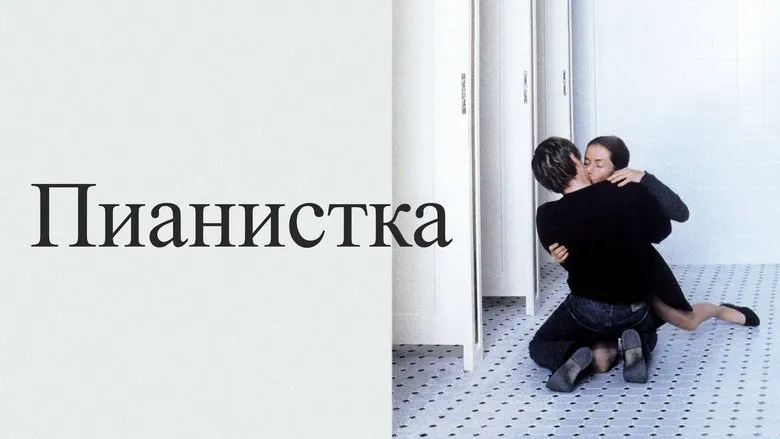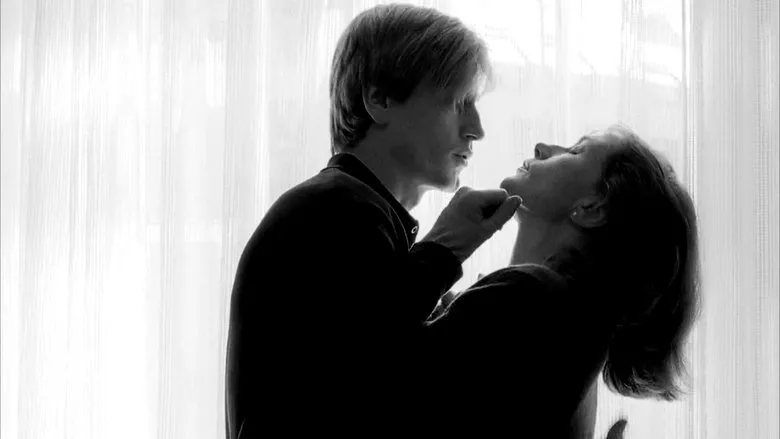Benoît Magimel himself graced the first screening of “The Piano Teacher” at the “Cinema Center.” This charming young actor, rumored to be Juliette Binoche’s boyfriend, is so quintessentially French in real life that it’s almost baffling how he managed to portray such a purebred German on screen. He recited a few pre-recorded phrases in Russian, the most memorable being “dear Moscovites,” and exited the stage to thunderous applause. The hall was packed, everyone watched intently until the end, although many were shocked, emitting nervous giggles where there was no humor to be found, and sitting silently where “laughter through tears” was clearly programmed by the director. However, a “normal” reaction to such an extraordinary and provocative film (as is everything Haneke has done lately) is hardly possible at all – viewers, even seasoned ones, involuntarily engage their psychological defense mechanisms. A similar reaction was observed during “Funny Games” – people couldn’t find peace, either psychologically or, at times, physically. But in that thriller, the horror was external and loud, whereas in “The Piano Teacher,” the dominant horror is what is very accurately described as quiet. Having seen the film for the third time (after Cannes, it was shown at the Moscow Film Festival), I can attest that the spectacle was even more captivating than the first two times – partly because you catch details that were missed before.
The Enigmatic Erika Kohut

So, the pianist (or rather, a professor at the Vienna Conservatory) is named Erika Kohut, she looks to be around forty, but she still sleeps in the same bed with her despotic and neurotic mother (a superb role by Annie Girardot). It is mentioned that her father died in a mental asylum.

Erika’s professional life is quite settled, her family life is full of scandals, her personal life hasn’t worked out at all, and the director reveals her intimate life in meager portions, maintaining the tension of the viewer’s curiosity (what else will be discovered?) – although this is one of those cases where knowing the plot doesn’t spoil the impression. Erika visits porn booths where she watches XXX videos, inhaling the smells of the previous visitors’ emissions, spies on couples copulating in cars, and performs mysterious bloody manipulations with a razor blade between her legs (what and why she does it, even women can’t explain, let alone men, and the saving word “masochist” explains very little). At first, while it seems that these are just shameful but harmless habits, she is sympathized with. But when she adds (seemingly out of jealousy, but not in a state of passion, but coldly and fully aware of the possible consequences) shards of glass into the pocket of her student (!), a significant portion of the audience that prefers “normal movies about normal people” loses all identification with the heroine and trust in the film, which begins to seem pathological. Meanwhile, this – I have to correct my own conclusion made in Cannes – is not pathology, but provocation: Haneke works as much with the actors as he does with the audience’s perception. At the same time, the idea that the film conveys cannot be called particularly new – the fact that still waters run deep has been known since God (or the devil) knows when, and the fact that this still water can be the most refined culture is written in black and white by Freud. But, as Sartre noted, “hell is other people.” Knowing the mechanism of this protective transfer, Michael Haneke does everything to ensure that “hell is other people” changes to “hell is ourselves,” and he does this with an artistic force that makes one recall Bergman, who also turned many things inside out.
Sado-Masochism and Societal Critique
A young pianist falls in love with Erika, she seems to reciprocate, but doesn’t succumb to his sensual impulse, and unexpectedly offers him a detailed program of sado-masochistic games, which he refuses to carry out with contempt. Magimel plays a smart, ironic, and self-confident man, who, however, is completely unprepared to encounter the hell that has opened up to him in the soul of his beloved. This performance is particularly remarkable for its hidden irony towards the character, thanks to which he sometimes looks quite comical. The same, by the way, can be said about Annie Girardot in the role of the tragicomic old woman, unable to let her daughter out of her control and leave her in peace for a minute – moreover, the typicality of this mother, despite her obvious pathology, does not amuse, but terrifies. Unlike Magimel and Girardot, Isabelle Huppert does not allow either her own or the viewer’s mockery of the heroine – her sexual “script” (in the sense of E. Berne), that is, her internal scenario, is tragic in its essence, only the form of its expression in the form of instructions for use (or rather, sexploitation) of herself is ridiculous. Erika, of course, is obsessed with her complexes and obsessive desires, but she is sane and deeply unhappy, and the actress conveys this ineradicable unhappiness with exceptional expressiveness – a glimmer of pain in her eyes, a dead expression on her face, a complete inability to smile, and even the pallor of her incredibly freckled skin. At the same time, she is not hopeless and seems even ready to step over her mania for the sake of love – but at this moment, the director sets in motion the complexes of her partner. In caring for his male dignity, the self-confident intellectual and athlete not only becomes an ordinary vulgar man (“you can’t treat a man like that,” “you’re behaving like a slut,” etc.), but also crosses all permissible boundaries when he breaks into Erika’s apartment, where, with the cry “You wanted this?!” he beats and rapes her. She wanted it, of course, but not this at all. She wanted to control her own sexploitation (the paradox of the sado-masochistic instruction is precisely that it is not just a command for another person, but a command to command oneself), and within the framework of a game, albeit painful, but not a physical duel, in which she is bound to lose. The ending of the film is open – and one can imagine what it cost the director, who would have found it much easier to end it with a bloody guignol or a simple murder. But, having prepared to kill Klemmer, Erika stabs herself – not to settle scores with life, but to punish herself for her own intention.
So far, we have only talked about the individual context, but the socio-cultural context is also very significant in the film. Haneke himself has repeatedly emphasized that he is not talking about a private pathology, but about what society does to women, and Elfriede Jelinek, whose novel the film is based on, has said so much about the detrimental influence of society, family, upbringing, education, and even classical music itself on the libido of Austrian women that it’s hard to believe. Let’s assume that both authors have overdone it a bit for the sake of show, but this excess is not accidental or individual, as evidenced by the film’s success in the most elite circles. Part of this success, of course, is due to the rare mastery of directing, which in this case is especially appropriate to compare with conducting – the pre-camera action is played out, staged, filmed, edited, and voiced with a magnificent sense of tempo and rhythm. The soundtrack, of course, is not synchronous, but the movements of the actors’ hands (not doubles!) show that they really played what sounds from the screen during filming. At the same time, Schubert, Schumann, and Schoenberg, starting in the conservatory and spilling over into the most intimate, searingly frank (despite their visual chastity) and dramatic scenes, are largely convincing without any words, of which there are so many in “The Piano Teacher,” as if it were made by a Frenchman. In addition, Erika Kohut is not just a pianist, but a music teacher, concentrating in herself the complexes of both professions, and to a greater extent the profession of teacher than performer of music. But the connection between sex and pedagogy is a taboo subject, discussed only at the level of pedophilia.
At the same time, Haneke leaves the viewer the opportunity to attribute the whole story to purely individual and even biological circumstances, such as a half-mad mother and a crazy father, although he leaves it only to remind us after a while about the madness of the music itself and the genius composers who created it. And underlying it all is the theme of the “Kreutzer Sonata” – but not Beethoven’s, but Tolstoy’s, who, as we know, rebelled against what music does to a person against their will – in other words, against the manipulation of consciousness. The old man, of course, went too far – but still, still, still…
Let’s stop here, because we can talk endlessly: unlike many films, the end of “The Piano Teacher” does not coincide with the end of its perception – which is why it makes sense to watch it.